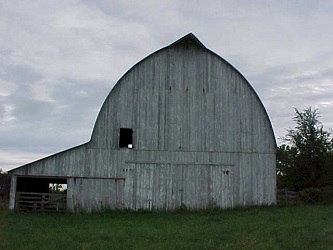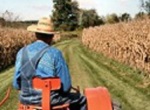A Rural Neighborhood Should Involve Everyone
Last Updated: June 26, 2025
A rural neighborhood needs a community organization every bit as much as an urban one, but effective problem-solving results only when rural folk adapt their typical ways of interacting to the 21st century environment. In this article we point you to some useful resources for making sure that your way of life sustains the next generation and retains its appeal.
Some of you might resist the terminology here and think that rural and neighborhood are two mutually exclusive terms. But actually I grew up in a highly rural area completely dependent on the agricultural economy, and it was definitely a neighborhood.

By that I mean that we knew which roads were in the neighborhood and which ones weren't. While some families were better friends than others, there wasn't any doubt about who "belonged." When there was trouble or rejoicing, we knew who our people were.
When I taught introductory urban and regional planning to college students majoring in something else, I asked who grew up in a neighborhood and who didn't. There wasn't any difference among cities, small towns, and rural areas in the percentage of people who felt they grew up in a definite neighborhood. From this experience I learned that the term rural neighborhood should not be thought of as strange.
Organizing for Results in a Rural Neighborhood
Forming a working organization sharply focused on goals is the single most important thing you can do to stem a general sense of decline or uncertainty in rural communities. Yes, forming an organization can strengthen the warm and fuzzy sense of belonging that stems from being part of a neighborhood, but it also can be instrumental in obtaining good maintenance for your roads, an action plan to deal with economic challenges, attention to your rural housing needs, and assistance with problem properties, people, or theft.
When you do that, you let your county or township authorities know that you are serious about results, and you are willing to work to make your area special. You also might be able to revive an old organization, whether that is a school support organization that no longer exists because the school district consolidated with other schools, a former church that no longer meets, a rural co-op that no longer operates, or a women's club that doesn't meet now because the women are working in town during the day.
Regardless of whether you have to start from zero or whether you can revive a sleeping organization, this page contains some advice.
Five Key Ideas for Rural Organizations
1. If you do not have a clear sense of boundaries for your neighborhood, ask people and see if any consensus emerges. If not, draw a boundary arbitrarily and start work. If you learn later that others are offended because they were omitted, or that you actually have a common issue with another group, you can expand your boundaries. Try to stay within the same school district.
In rural areas, you may not have a name for your neighborhood, but if there's any old historic place name, start using it. Or if you can easily fabricate one based on the name of your local mountain peak or stream, do so. But in rural neighborhoods, it isn't essential.
2. Investigate whether an existing group will serve the purpose if you can expand it so all members of the family are invited. Sometimes there's a farm or hunting group, and only the men tend to be invited. Or the women might have a social club. And the children already may be involved in 4-H or maybe scouting.
If the existing group isn't enthusiastic about allowing everyone to come in under their tent, you can always form an auxiliary group, such as "XYZ Club Friends." But then you need to be inclusive, if there are households in your geography that weren't part of the original group. It's just that tagging onto an existing group can make an easy start.
3. If you find that you will need to start a community organization from scratch, do read our pages on starting a neighborhood association and adapt those ideas as necessary to fit your setting and usual patterns of associating and communicating with one another.
A critical thread from that article is that you probably need to focus in on an issue that you want to tackle, so keep reading into the next two sections to get some ideas on what that might be.
4. If there is a need to socialize that's readily apparent, give that plenty of space in your meetings. Food and talk are important to rural families. In fact, if you do nothing but socialize for awhile, that's fine in rural neighborhoods. Eventually someone will be brave and raise the hard questions.
5. Use your organization to build loyalty to a rural way of life, and to the things that are great in your particular community, among children and youth. You think they will stay, but chances are good that unless both the self-employment income or jobs, plus the social scene, offer good prospects, they will not stick around. Our favorite way of figuring out what will appeal to these age groups is to break down and ask them!
Four Important Aspects of Dealing with Rural Conflict
We so appreciate the work and insights of Frank and Kimberlee Spillers when they described how rural people sweep problems under the rug. This fits my life experience too.
In the meantime, we offer the benefit of our own professional experience.
1. If you cultivate the habit of communicating respectfully, lovingly, and in good faith, either the solution will appear or individual households will make the best possible decisions for themselves about how to deal with this new reality.
Often in rural America, serious problems are easy to see, but hard to talk about. People don't really want to admit that they're losing population, it's going to be hard to keep the school open, and the brave talk about finding a new owner for the café isn't going to materialize. This basic problem of the community having lost its economic viability slowly over several decades may take a lot of patience to deal with.
2. If a gripe or a problem readily emerges, start brainstorming about steps you can take to ease the problem. Now there's an issue with that advice, because often rural families don't know how to navigate the perplexing world that is so different from the agricultural, mining, or fishing background in which their parents grew up.
To help with that, on this website we offer somewhat more detailed articles about frequently occurring rural challenges as shown below. Follow through with reading about any of these topics that you think remotely pertain to you, and use these articles as a jumping-off point for realistic thinking and conversation about new initiatives you could be taking.
3. Whether you find a personality conflict or people forming into camps on different sides of a disagreement, try to get neutral, well-respected people to help defuse the situation. This might be your local "born leader" type, a clergy person, the extension agent, or the store owner. Even better, if you can entice one of these types of folk from a nearby community to come facilitate a session with your local group, you may be able to reach a new level of objectivity about what is really happening.
I observed a long Sunday afternoon sit-down where a clergyperson who formerly served in that community came to sit with the group and help them work out a peace plan between two opposing factions.
4. If people are unwilling to jump right into direct dialogue about the problem, do what rural folk do: talk for 20 or 25 minutes about the weather, the horses, how bad the younger generation is, and so forth, until someone has the nerve to talk about the business at hand. If that doesn't come until after the chili supper, the barbecue, or the bonfire, so be it.
Additional Web Pages That May Relate to Your Rural Issues
Vital information that you need can probably be found, or at least hinted at, in many pages of this website. Below we show you some photo icons relevant to various angles on rural questions. Keep in mind you can always look at the sitemap or use the search box too. Communities are so individual, so for you, small town character, tourism and economic development, or even starting a petition may be more relevant than what we have selected. Poke around; you'll find something helpful.
Join GOOD COMMUNITY PLUS, which provides you monthly with short features or tips about timely topics for neighborhoods, towns and cities, community organizations, and rural or small town environments. Unsubscribe any time. Give it a try.








